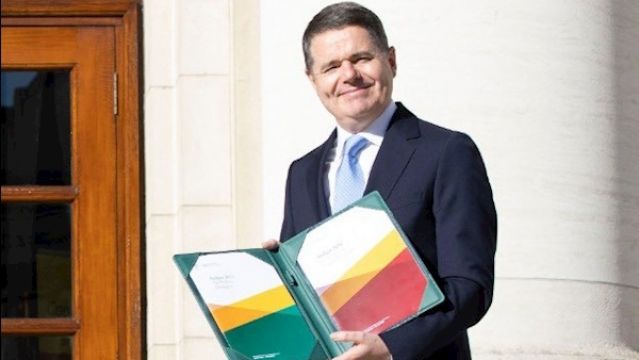It was the first budget announcement since the onset of the coronavirus pandemic and the first time the document has been delivered outside Leinster House.
As he unveiled details of the document on Tuesday afternoon, Mr Donohoe said the country was “now responding to the worst global pandemic in a century”.
A total budgetary package of almost €18 billion was announced by Mr Donohoe and Minister for Public Expenditure Michael McGrath in the Dáil, which was sitting in the National Convention Centre.
Here are the main details of their plans.
– Mr Donohoe said the country was "responding to the worst global pandemic in a century, we live in an era of great uncertainty and risk", and added that "overcoming these challenges" was the central goal of Government.
– He praised the "hard work, dedication and resilience of the Irish people".
– He said "uncertainty about the future of lives and livelihoods is great" but that the country "will prevail and build a stronger Ireland, Budget 2021 is a bridge to that future."
– Due to previous budgets, Mr Donohoe said country had a surplus €1.3 billion and a "rainy day fund" of €1.5 billion.
– "The better our public health, the stronger our economic health," he said.
– "Budget 2021 has been prepared against a background of extraordinary circumstances", as a result "it is exclusively focused on the rest of this year and next year".
– GDP is predicted to decline by 2.5 per cent with domestic demand falling by six per cent.
– A total loss of 320,000 jobs is expected in 2020, recovering by 155,000 jobs next year.
– The levels of economic activity last year "may not return until 2022".
– Building up healthcare capacity, supporting employment and household income are the main objectives of the budget, Mr Donohoe said.
– Budget 2021 forecasts a deficit of €20.5 billion, borrowing will be reduced gradually.
– Mr Donohoe said borrowing must be reduced in coming years to balance national finances and building employment will be crucial.
– The National Economic Plan will be published next month and a paper will be published later on Tuesday.
– An overall budgetary package of €17.75 billion, translating into: €8.5 billion on public services, €3.8 billion for a range of departments, core capital programmes costing €1.6 billion next year, €3.4 billion on the Covid-19 recovery fund, capital expenditure costing €10.1 billion and a net tax package of €270 million.
– Taxes on intellectual property will be amended to ensure "that all intangible assets acquired after today will be fully withing the scope of balancing charge rules".
– Farmers' flat VAT rate addition to be introduced from 5.4 per cent to 5.6 per cent.
– There will be no change on the price of alcohol, as predicted.
– Excise duty on a pack of cigarettes will be increased by 50 cent, cigarettes in "most popular category" will now cost a minimum of €14 a packet.
– Mr Donohoe said he was not making any broad changes to income tax credits or bands at this time.
– The ceiling of second USC band will rise from €20,484 to €20,687.
– The weekly threshold for the higher rate of employers PRSI will go from €394 to €398.
– For the self-employed, Mr Donohoe said he would equalise the earned income credit with the PAYE credit by raising it by €150 to €1,650.
– People working from home will be able to claim tax deductions on utilities such as light, heating and possibly broadband.
– There will be an an increase in the Dependent Relative Tax Credit from €70 to €245.
– Employment wage subsidy scheme will be altered and extended until the end of 2021, there will be no "cliff edge" to the scheme.
– A new scheme will support businesses during Level 3 restrictions. The Government will make payments based on 2019 average weekly turnover. This will apply to businesses where restrictions prohibit of prevent customers, it will be in effect until March 31st next year. Businesses will have to prove their turnover is less than 20 per cent of same period in 2019.
– Reduction in VAT rate for the hospitality industry from 13.5 per cent to nine per cent will be in place from November 1st until December 2021.
– A tax credit for the digital gaming sector will be introduced.
– Energy efficient capital allowance scheme will be extended for a further three years.
– The help-to-buy scheme, worth a maximum of €30,000, will be extended until the end of 2021.
– Carbon tax will be increased from €20 to €33.50 per tonne of C02, this will increase each year until carbon tax hits €100 per tonne.
– The Department for Justice will receive €147 million, this will include an extra 500 Garda staff and 600 gardaí along with funding for the inquest into the Stardust tragedy.
– Capital investment of over €258 million will be spent on court service modernisation.
– €61 million extra for Tulsa, €25 million for the Direct Provision system, €638 million investment in early years.
– €341 million will be allocated to the department of rural and community development, €5 million will be invested in digital hubs and broadband development in rural Ireland.
– The 15-month requirement for Jobseekers to receive the Christmas bonus will be reduced to four months, including those on the Pandemic Unemployment Payment.
– The planned increase in pension age to 67 will not go ahead, while Mr McGrath revealed a Pensions Commission will be established.
– Qualified child payment will be increased by €5 for over-12s and €2 for children under-12s.
– The living alone allowance will be increased from €14 to €19.
– The social welfare packages announced are worth a total of €510 million.
– The money invested in education will also be used to reduce the pupil-teacher ratio from 26:1 to 25:1
– €8.9 billion has gone to the Department of Education, with €2 billion specifically allocated to special needs education. This will be used to hire an additional 990 special needs assistants and to create 300 new teaching positions.
– €50 million in supports for students in higher education will be allocated.
– The SUSI fee grant for post-graduate study will be increased by €500 to €3,500.
– An additional €1 billion will be put aside for public transport in 2021.
– €50 million will be spent on live entertainment supports and arts council funding, which will increase it to €130 million overall.
– €55 million will be spent on a tourism business support scheme and €5m will be spent on tourism product development.
– €3.5 million will be allocated to TG4 as part of a programme for Irish language supports.
– An additional €29 million will be spent on heritage sites in Ireland.
– €2.4 billion will be allocated to support an additional 15,000 people on the Housing Assistance Payment (HAP) scheme.
– €5.2 billion to be spent on housing in 2021, an increase of €773 million.
– €500 million will be put toward building 9,500 social housing units in 2021.
– An affordability package for affordable housing and cost rental schemes worth €110 million will be introduced next year.
– €22 million will be spent on homelessness programmes, including additional beds.
– Cancer screening will also get additional funding.
– Mr McGrath said an extra 1,146 acute beds will be provided. There will also be an increase in critical care beds to 321 by the end of year from 255 pre-Covid-19.
– €4 billion will be spent on the health service, with €38 million specifically allocated for mental health support.
– €340m will be spent on Brexit supports next year, €600m will be added for capital budget. Total exchequer investment in capital will rise above €10bn for the first time ever
– €20 million will be allocated to disability support.
– An additional €80 million for the Department of Education and €44 million for Irish Water was announced.
– Michael McGrath announced an extra €500 million will be allocated to support businesses, a commercial rates waiver of €300m will also be introduced.







